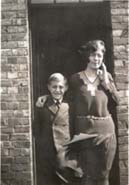

Bill’s First Strike
“It was during the school holidays when I was twelve or thirteen years old. A number of us youngsters decided to go to one of the local farms to pick potatoes. We walked to the nearest farm, about three miles away, and asked the farmer if he wanted any potato-pickers. There were about fifteen of us, and he picked out those he thought were the strongest. Among us were two or three lads who had worked at another farm the previous year, where they had been paid one and sixpence a day. They took the lead and asked the farmer what he was going to pay us. He said: 'A shilling a day'. There was some grumbling at this, but he would not budge, so we agreed to start at eight o’clock the following morning. The custom was that you brought your own pail for potato picking and were allowed to fill it each night with potatoes to take home.
The next day at the farm we were taken to the field in which we were to work. It was a sloping field and the bottom end was wet heavy soil. The machine went up the field and we, together with some women, picked up the potatoes it turned up, put them in the pail, and then took them to the end of the row where we poured them into a sack. It was heavy, back breaking and monotonous work. We had a dinner break and finished at six o'clock. By the time we came to the dinner break on the second day, the difference between a shilling and one and six had grown enormous. We were agitated throughout the dinner time.
After dinner we had been working a short time when the biggest lad suddenly shouted: 'How-way. Let's gan and see the farmer!' We picked up our pails immediately and followed off the field and up to the farmhouse. The farmer saw us coming and came out. We ran up to him and demanded one and six, talking on top of each other and working up more indignation. He would not budge and before long he let us know the main reason why: there was a crowd of lads and girls hanging around one of the gates to his farmyard. They came from Greencroft, one of the nearby villages. ‘See those?’ he said, ‘They’ll do it for a shilling a day. You can have your shilling for today, then you can take your pail of potatoes and off you go home.’ He went to pick his labourers from the crowd at the gate. There were too many of them for us to fight; the strike had been broken. We went off, but before we went home we created havoc in one of his barns while he was in the potato field.”
From Bill’s autobiography: “Lifelong Apprenticeship”
Picture: Bill with sister Peggy